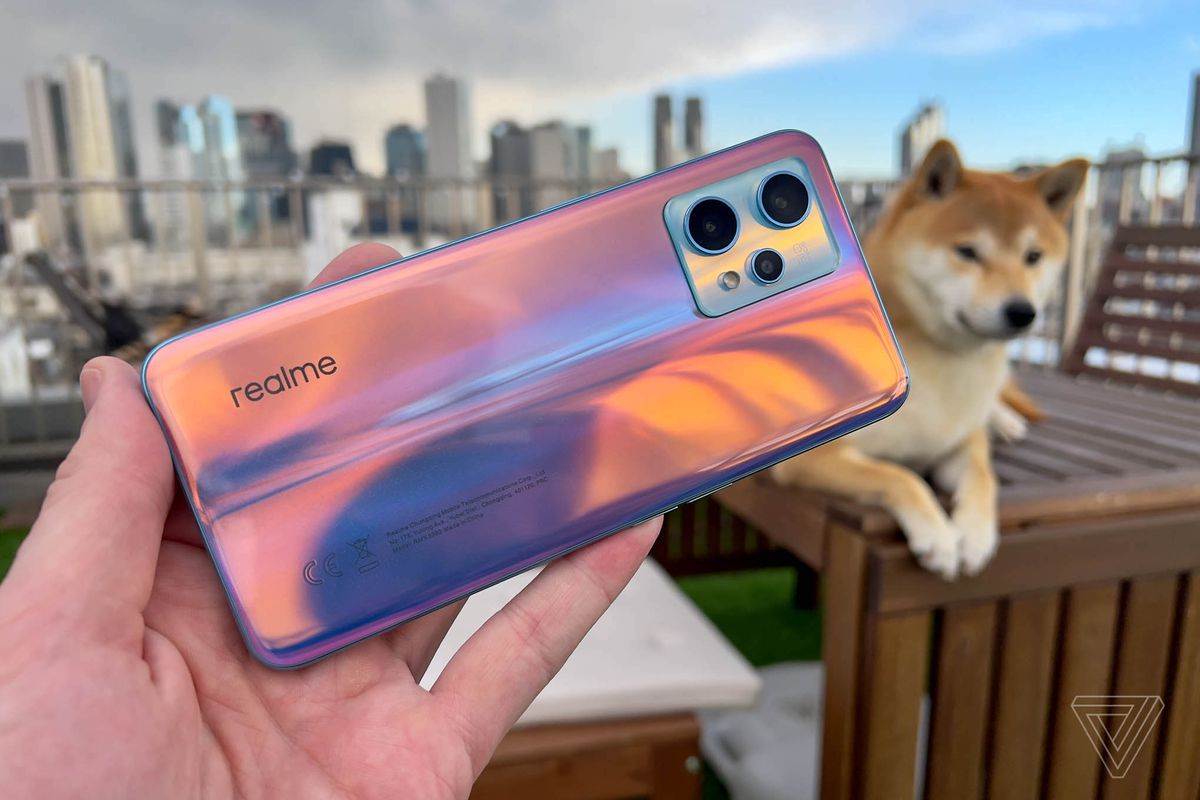The Realme 9 Pro+ is a new addition to the company’s vast and already confusing lineup of smartphones. Traditionally, Realme has always led with the core models in its number series together, but this year we got the Realme 9i first, in January. With this latest launch, instead of the expected Realme 9 and 9 Pro, we’re getting the Realme 9 Pro and a new Realme 9 Pro+.
The Realme 9 Pro+ is meant to take on the new Xiaomi 11 series and the OnePlus Nord series of mid-range smartphones. So, what’s new about the Realme 9 Pro+, and is it worth the premium over the Realme 9 Pro?
Realme 9 Pro+ price in India
The Realme 9 Pro+ is available in three variants. There’s a base variant with 6GB of RAM and 128GB of storage, priced at Rs. 24,999 in India. The second variant has 8GB of RAM and 128GB of storage, and is priced at Rs. 26,999. The top-of-the-line option with 8GB of RAM and 256GB of storage is priced at Rs. 28,999. I received the top-end version for this review.
Going by the launch prices of the Realme 9 Pro+, there seems to be an overlap with Realme’s own GT Master Edition (Review), which starts at Rs. 25,999. This phone offers slightly better core specifications such as a 120Hz refresh-rate display, but lacks the superior primary camera sensor and optical image stabilisation (OIS) offered by the new Realme 9 Pro+. It’s great to have more options, but this does nothing to make the lineup less confusing for buyers. Your choice will ultimately boil down to what you prioritise more, a better camera or display.
Realme 9 Pro+ design
The Realme 9 Pro+ seems to have caught up with the new fad of colour-changing smartphones rather quickly. This phone is available in three finishes: Midnight Black, Aurora Green, and Sunrise Blue. Of these, only the Sunrise Blue finish changes colour when exposed to sunlight, just like the Vivo V23 Pro (Review).
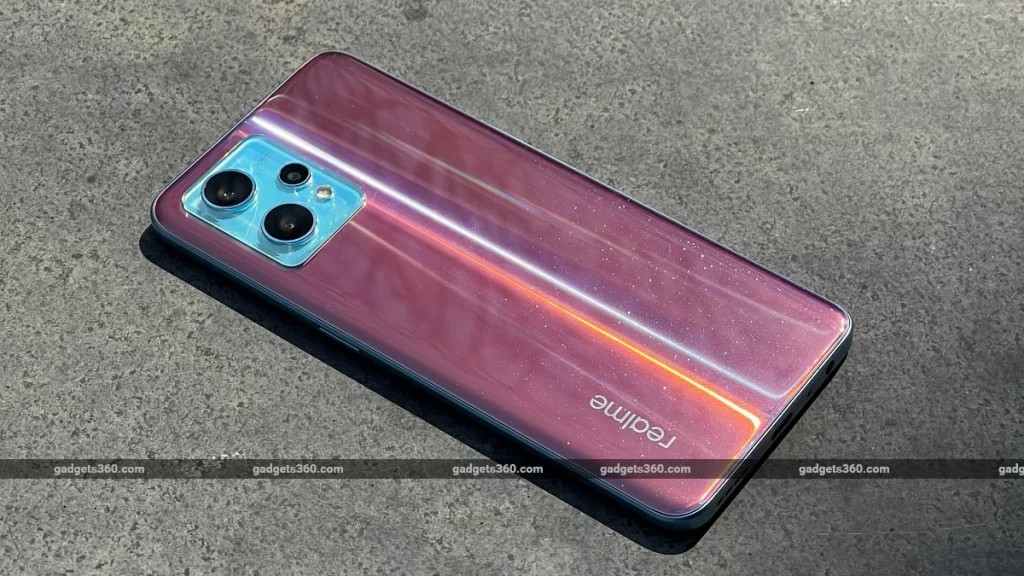
Realme’s version of the same colour-changing process enables the 9 Pro+ to switch from a glossy sky-blue colour indoors to a shade of maroon under sunlight. I didn’t find this as appealing as Vivo’s gold-to-green transition on the V23 Pro. The overall look doesn’t feel very premium either, mainly because of the fingerprint-prone rear glass panel.
This colour-changing bit aside, the Realme 9 Pro+’s design looks like that of any Realme smartphone. It has a polycarbonate frame with flat sides sandwiched between two sheets of glass. The phone is quite slim, measuring just 7.99mm, and it feels comfortable for one-handed use mainly because of its low 184g weight.
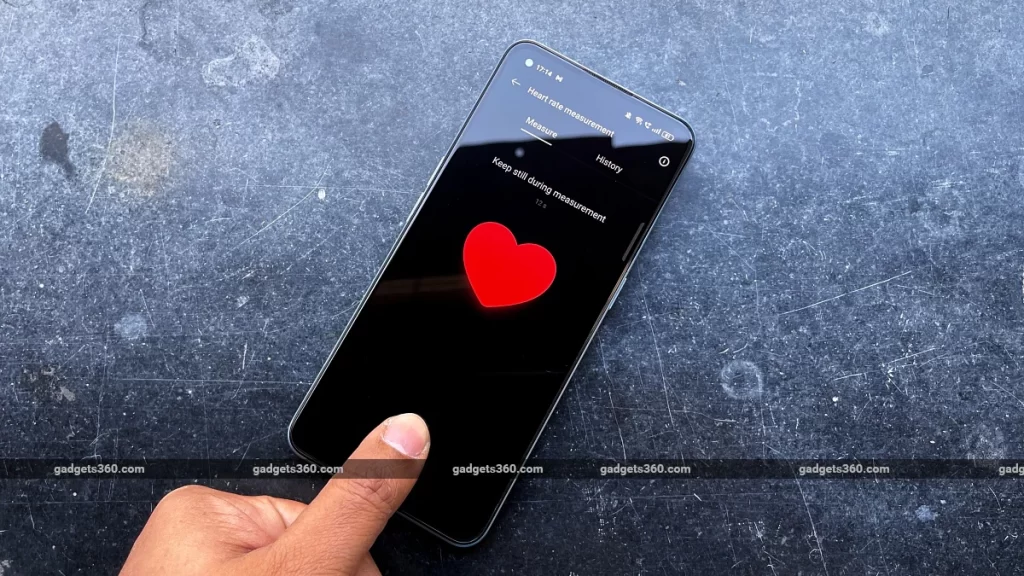
The display is flat and has a hole-punch front-facing selfie camera. There’s an in-display fingerprint reader and you can also measure your heart rate, which according to Realme is still an experimental feature. This is only usable if enabled in the Realme Lab section of the Settings app. One design detail I did not like was the noticeably thick chin below the display.
Realme 9 Pro+ specifications and software
Realme has gone with the MediaTek Dimensity 920 SoC, which is also found in the recently launched Xiaomi 11i series. This SoC runs at a maximum clock speed of 2.5GHz and is manufactured using a 6nm fabrication process. The phone supports several 5G bands along with dual-5G standby. It also has Wi-Fi 6, Bluetooth 5.2, and the usual satellite navigation systems. The device is powered by a 4,500mAh battery which can be charged quickly using the 60W charger that comes in the box.
The new Realme 9 Pro and 9 Pro+ are some of the first phones to run the Realme UI 3.0 software, which is based on Android 12. There are tonnes of preinstalled third-party apps that can be uninstalled and some Realme-branded ones that cannot be.
Realme UI 3.0 is not as heavily customised as Vivo’s Funtouch OS, for example, and is more similar to stock Android. This makes it gel well with the new Material You design of Android 12. While certain features of Android 12 such as the powerful new search get the boot, the privacy dashboard and related features have made it. Unlike Vivo or Samsung, Realme’s selection of UI widgets has always been quite limited, so the new Android 12 widgets do not feel out of place on the home screen.
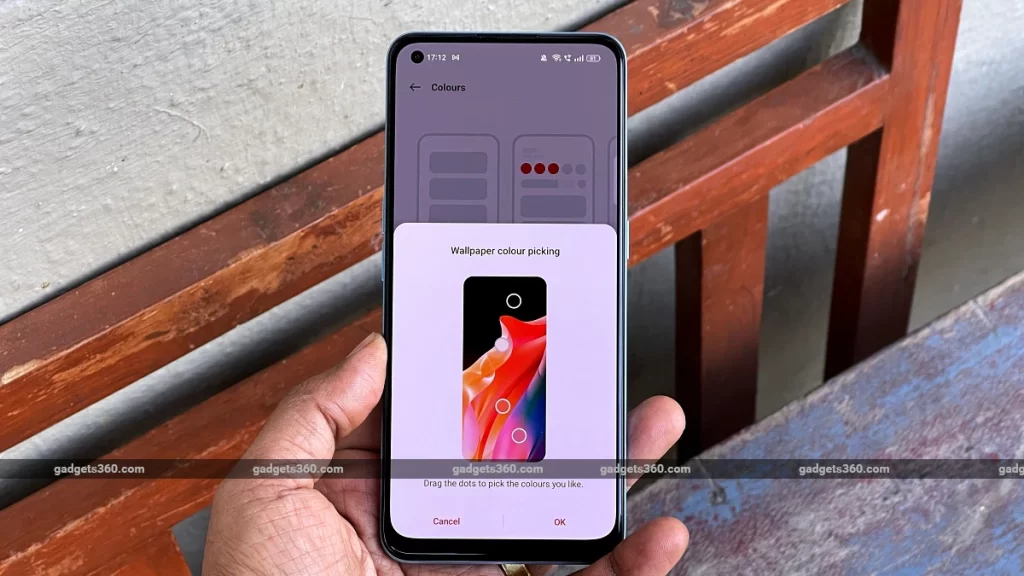
Realme UI 3.0 still looks like Realme’s take on Android. Its design and fonts appear quite consistent, until you jump into the Privacy Dashboard in the Settings, where you are greeted with a stock Material You UI that clearly looks very different. According to Realme, certain sections of Android 12 (Privacy Dashboard, Permissions Manager, Digital Wellbeing) are required to have the stock appearance, regardless of the custom skin applied to the OS. I also came across some minor theming glitches such as greyed-out text in collapsed notifications in the pull-down tray when using dark mode.
The Realme 9 Pro+ has a dynamic theming system similar what you’d get with Android 12 running on a Pixel device. This feature picks colours from the wallpaper you choose and then applies them to interface elements such as the notification tray toggles, Settings menu icons, and so on. You can also pick the colours you want from your wallpaper and let the theme engine create a complementary palette from them. However, the implementation is a bit buggy. The revamped Android 12 widgets from Google apps and the Google keyboard don’t seem to change colour along with the rest of the UI, as they do on Pixel devices. In short, a bit of fine-tuning is still needed.
Realme 9 Pro+ performance
The Realme 9 Pro+ features a 6.4-inch AMOLED display with Corning Gorilla Glass 5 protecting it. Colours looked a bit oversaturated at the default ‘Vivid’ colour setting, and I preferred the toned-down ‘Natural’ mode. Sunlight legibility was quite good, and text and images looked sharp. Unfortunately, the Netflix app was not available because I had a pre-production unit, but I was able to test streaming video using Amazon Prime, which worked well. The phone had some trouble representing accurate colours when viewing HDR shows, and they were pale and muted; nothing like how they should have looked. Realme has said that a fix for this issue should be rolled out soon. Standard definition content appeared just fine, with deep blacks. The experience came together well thanks to this phone’s stereo speakers, which sounded loud and clear.
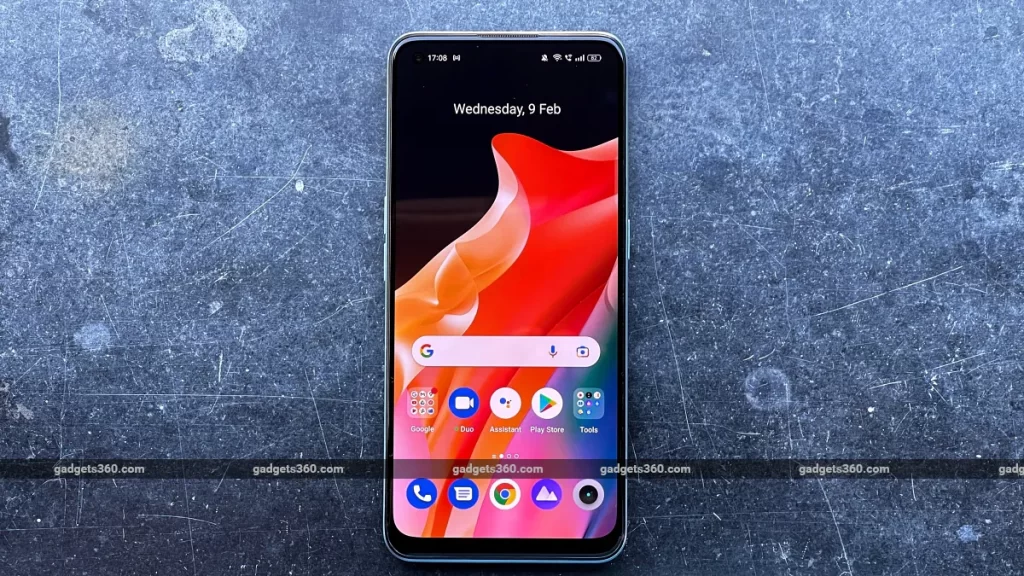
The display refresh rate can only switch between 60Hz and 90Hz. Even when set to the latter, it stays at 60Hz when playing games but goes to 90Hz when browsing through the phone’s interface. Opening the YouTube app also made the screen’s refresh rate lock at 60Hz, even though the video playing on screen was running at 30fps. This means that the display’s optimum refresh rate is only available when interacting with the phone’s software, and not when playing games, as of now.
When it came to benchmarks, the Realme 9 Pro+ did not disappoint, and performed on par with the competition. It scored 5,07,258 points in AnTuTu and 818 and 2,316 points in Geekbench’s single- and multi-core tests, respectively. Despite the bloatware, Realme UI 3.0 ran buttery smooth, and the 90Hz refresh rate display made UI interactions feel quite fluid.
Gaming performance was also quite good. The phone ran Call of Duty: Mobile at the default, ‘Medium’ graphics and ‘Very High’ frame rate without any issues. I didn’t notice any drop in performance when the graphics settings were bumped up further. For some reason, Asphalt 9: Legends kept crashing on startup, so I tried Real Racing 3 instead. It worked smoothly without any hiccups.
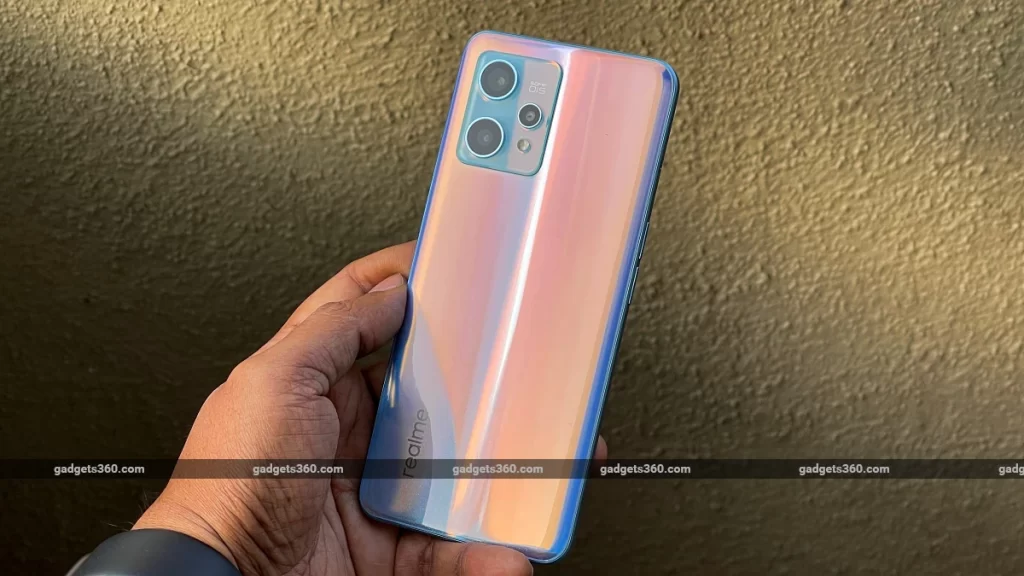
The Realme 9 Pro+ managed an impressive 23 hours and 36 minutes in our HD video loop battery life test. I managed to get a day and half of regular use which involved some gaming and camera usage. This is good for a mid-range device. Charging was also quite fast. The phone charged from zero to 80 percent in 30 minutes and was fully charged in 50 minutes using the bundled 60W charger.
Realme 9 Pro+ cameras
The Realme 9 Pro+ ditches the 108-megapixel camera of its predecessor in favour of a 50-megapixel primary camera, which also happens to have optical image stabilisation (OIS). It’s not just any sensor either, but a Sony IMX766, which we’ve only seen in more expensive phones such as the Oppo Reno 7 Pro (Review) and the OnePlus 9RT (Review) so far. There’s also an 8-megapixel ultra-wide angle camera and a 2-megapixel macro camera. Selfie duties are handled by a 16-megapixel front-facing camera.
The camera app is similar to what we’ve seen on recent Realme phones, but has a few changes. For instance, some of the controls such as the timer for photos and frame rate selector for videos are now moved under the three-dot button menu. As with all smartphones running Android 12, you will also notice a green dot appearing near the status icons to indicate that the camera is being used, which is a privacy protection feature.

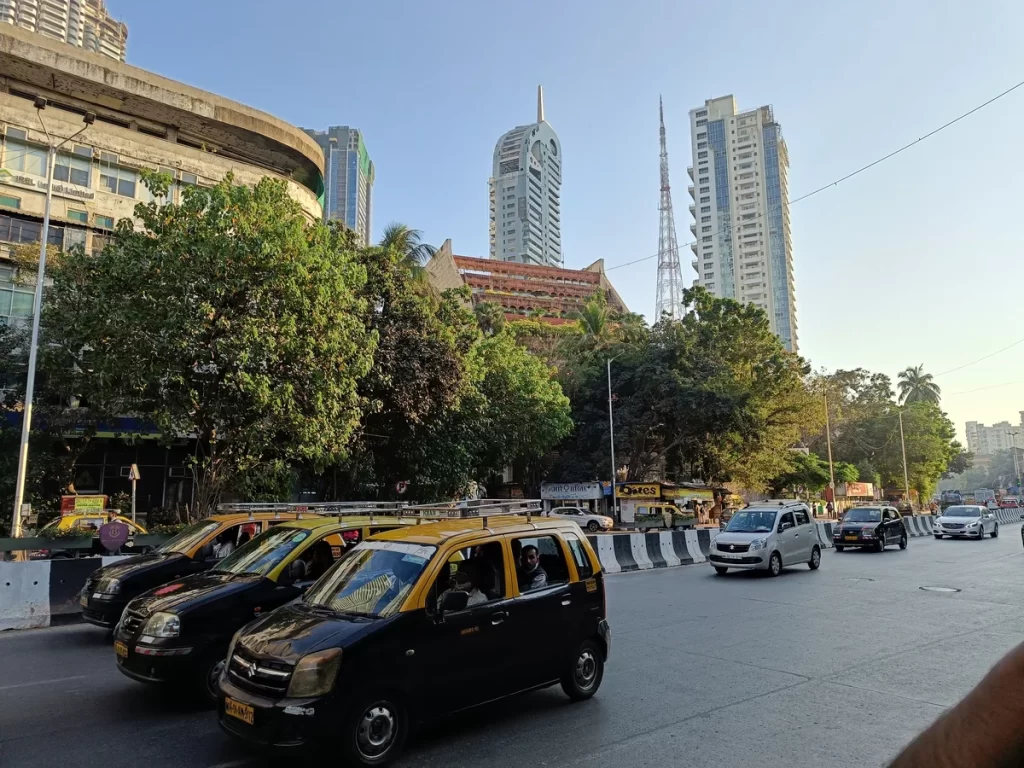
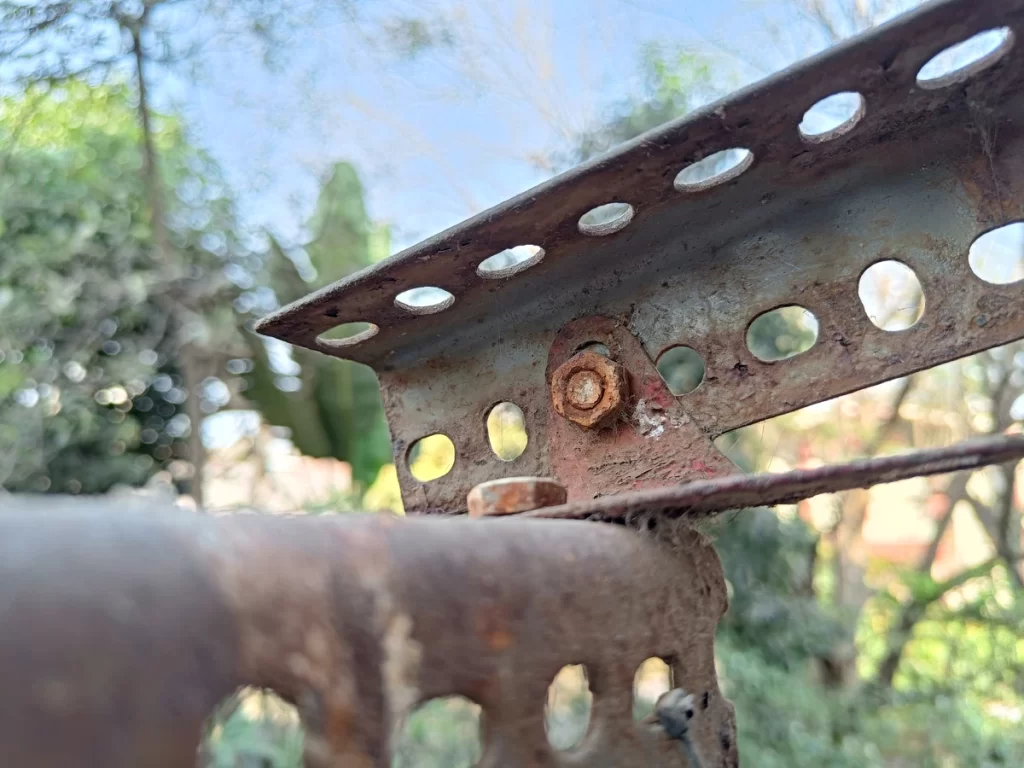
Daylight photos looked clean and sharp with good dynamic range and details. HDR was a bit aggressive, and colours were a bit oversaturated. I ended up turning the ‘AI’ toggle off as it tended to bump the saturation up even further. Portrait photos taken with the front as well as rear cameras came out sharp and quite detailed, with good dynamic range. Edge detection was also quite good.
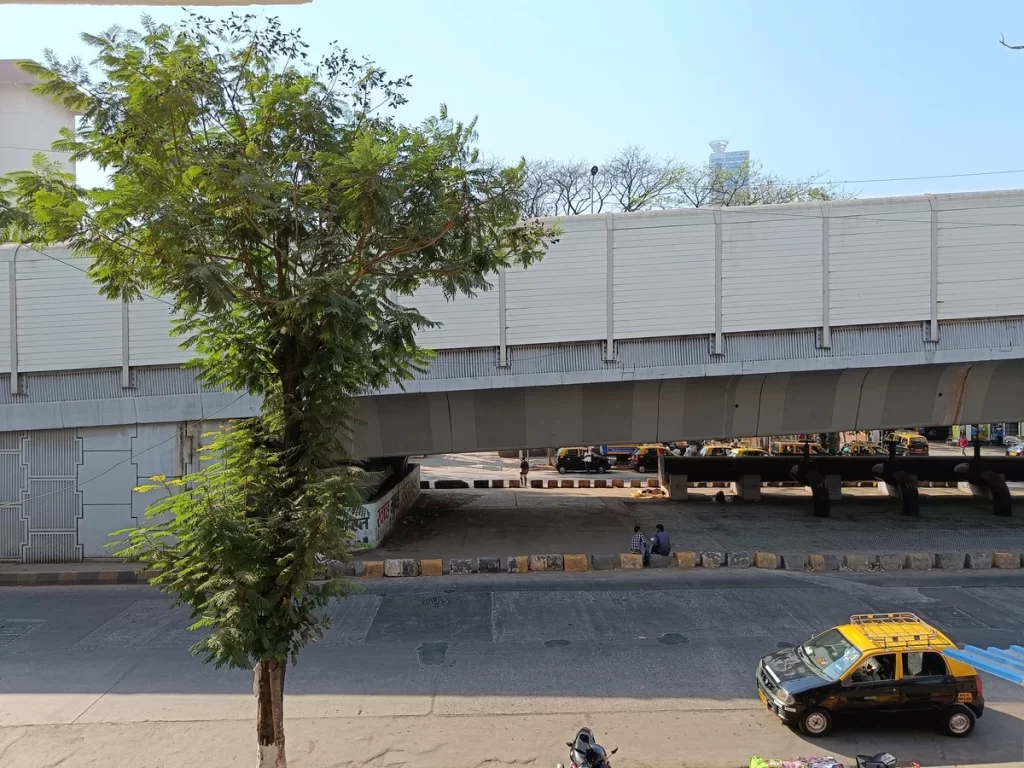
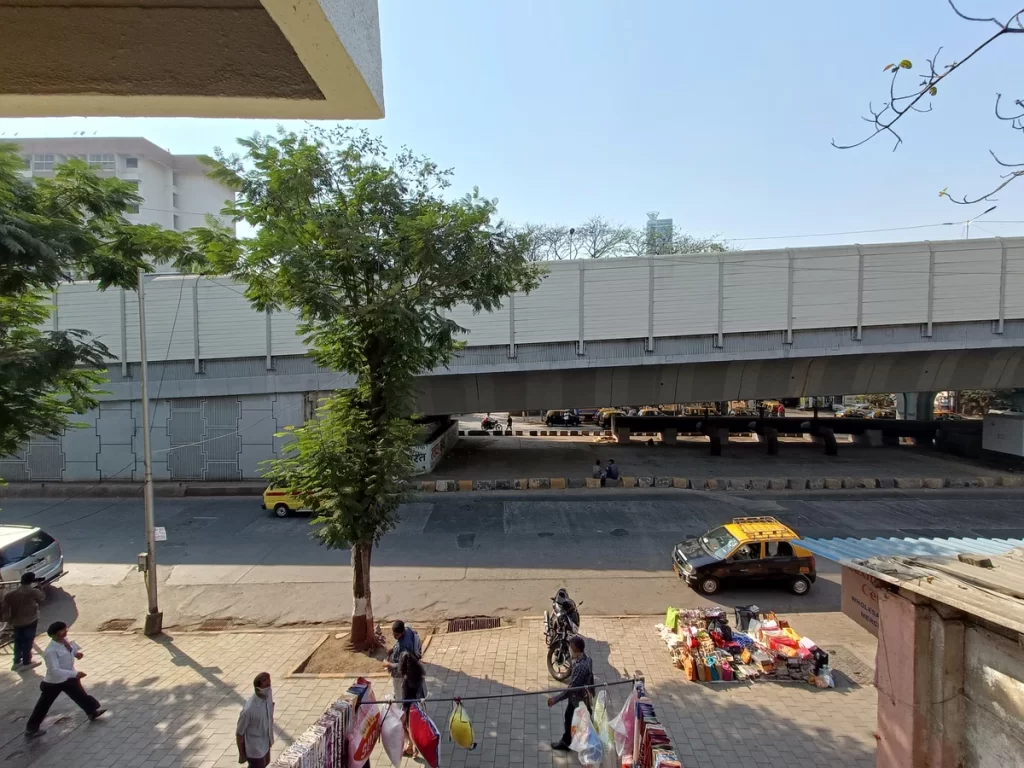
Photos taken with the ultra-wide-angle camera were surprisingly usable. They were not as sharp as ones shot with the primary camera, but had good dynamic range along with minimal barrel distortion thanks to software correction. The macro camera was useful even though the results appeared a bit oversharpened.
In low light, the Realme 9 Pro+ would automatically keep its shutter open for a second longer to gather more light. This was without turning on the AI mode. Images shot in low light, even in Auto mode, came out quite sharp and dynamic range was also good thanks to OIS. Switching to Night mode brought out even more detail.


There’s a ‘Street’ mode in the camera app which automatically sets up the exposure so you can capture things such as light trails. While these features have been present in previous Realme devices (and some from other brands too), I was impressed with how easily the Realme 9 Pro+ allowed me to capture such long-exposure shots without the need to stabilise it or mount it on a tripod.
Videos recorded at 1080p looked fine and were stabilised well, but were not as sharp as I expected. 4K footage (limited to 30fps) showed good detail and sharpness but was quite shaky and looked a bit choppy. The results were similar in low light as well.
Verdict
While the Realme 9 Pro+ and the 9 Pro might seem as though they have overlapping specifications, they clearly belong in different categories, given the brand’s hardware choices for both these smartphones.
The Realme 9 Pro is priced starting from Rs. 17,999 offers a 120Hz refresh rate display, a 5,000mAh battery, and a 64-megapixel primary camera, which actually make it seem better than the 9 Pro+ on paper. However, the Realme 9 Pro+ has an AMOLED display that can reproduce deeper blacks, 60W charging support, and a more advanced primary camera sensor plus OIS. So, despite their similar pricing, the audiences for these two phones should be quite different. The Realme 9 Pro will appeal to gamers who want a higher screen refresh rate, while the 9 Pro+ is clearly aimed at those looking to shoot better photos.
As for the competition, the Xiaomi 11i seems to offer the best value at this price point with similar or slightly better hardware. There’s also the Xiaomi 11i Hypercharge (Review) which is capable of 120W charging. The OnePlus Nord CE (Review) is another option in this price range, and offers a capable camera plus a clean software experience. As we already know, the OnePlus Nord CE is soon to be replaced by the Nord CE 2.
The Realme 9 Pro+ might not have very aggressive specs, but the company has made some sensible choices in areas that matter. Key among these is the OIS system and flagship-grade sensor in the primary camera, which deliver good performance in daylight as well as low light; something most smartphones in this segment struggle with. The MediaTek Dimensity 920 SoC is a solid performer too. You get Android 12 out of the box and Realme UI 3.0 runs buttery smooth. Battery life is also quite good. All of this makes the 9 Pro+ excellent value for money.
Next Story
-
Heavy Rains In Telangana For Next Three Days

The people of Telangana have been alerted because of moderate to heavy rains in the state for the next three days, according to the Indian Meteorological Department (IMD).
Now you can get latest stories from Hydnow everyday. Click the link to subscribe. Click to follow Hydnow Facebook page and Twitter and on Instagram
